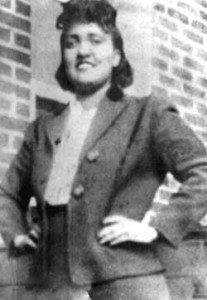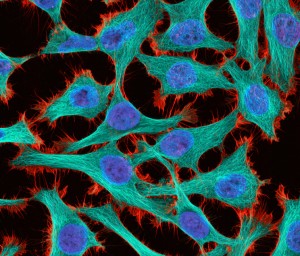Background
 Henrietta Lacks was a poor African American woman who died of cervical cancer in the 1950s at the age of 31. She was married and had five children. Following her death, a biopsy of her tumor was taken for research. She was given treatment for free at a public hospital and in return, samples of her cells were taken for research purposes. This was a common way in those days to obtain research. The cells that were acquired from Henrietta kept reproducing. They became the first cells to reproduce in a laboratory setting. Henrietta’s cells were used in varied ways including finding a vaccine to help prevent diseases such as polio. Scientists continued using these cells for different purposes and many businesses profited greatly from them as well.
Henrietta Lacks was a poor African American woman who died of cervical cancer in the 1950s at the age of 31. She was married and had five children. Following her death, a biopsy of her tumor was taken for research. She was given treatment for free at a public hospital and in return, samples of her cells were taken for research purposes. This was a common way in those days to obtain research. The cells that were acquired from Henrietta kept reproducing. They became the first cells to reproduce in a laboratory setting. Henrietta’s cells were used in varied ways including finding a vaccine to help prevent diseases such as polio. Scientists continued using these cells for different purposes and many businesses profited greatly from them as well.
Dilemma
There are two important ethical dilemmas presented in Henrietta’s case. The first dilemma involves whether a patient should give consent for their cells to be used for research and at the same time remain anonymous as to whose cells they are. In this situation from the 1950s, Henrietta was not asked for consent. However, today if the patient is competent, they are required to give informed consent. If they are not competent, the family of the patient is usually asked to give consent on their behalf. Therefore, consent should not be an issue today. Also, in this case, there was no anonymity. The public found out that the cells came from Henrietta Lacks and they were labeled HeLa cells. The ethical question of keeping a person’s identity anonymous is also usually not an issue today. Respect is given to a person’s privacy and people contribute their cells without labeling whom they came from. Another ethical dilem ma in this case involves whether patients should be compensated for being a part of research. In this case, there was no compensation given to Henrietta or her family for using her cells in research. Today, patients are encouraged to participate in studies and are given a compensation for their time. Although some patients are offered compensation, many voluntarily donate their cells for scientific research.
ma in this case involves whether patients should be compensated for being a part of research. In this case, there was no compensation given to Henrietta or her family for using her cells in research. Today, patients are encouraged to participate in studies and are given a compensation for their time. Although some patients are offered compensation, many voluntarily donate their cells for scientific research.
Reflection
In my opinion, Henrietta Lacks’ family should have been given some compensation. Her cells went on to provide many scientific benefits in research as well as a profitable industry. One form of compensation that I feel is appropriate in this case could possibly be in the form of healthcare. Henrietta’s family was poor and their daughter stated that they couldn’t even afford to visit doctors when needed. I find this situation unfair, especially since many businesses received a profit from her cells. It was publicly known that they were Henrietta’s cells and thus, it only seems justifiable that they should at least receive something in return. Therefore, I agree with how society handles donations today in keeping them anonymous. Donors do not typically find out about findings from their specific donations. This way, scientists can objectively research and use the information to advance cures for the wellbeing of society. These donations help medicine advance to find new treatments and cures for future generations.
Works Cited
Beauchamp, Tom L., and James F. Childress. Principles of Biomedical Ethics. New York: Oxford UP, 2009. Print.
Skloot, Rebecca. The Immortal Life of Henrietta Lacks. New York: Crown, 2010. Print.
Thomas, John, Wilfrid J. Waluchow, and Elisabeth Gedge. Well and Good: A Case Study Approach to Health Care Ethics. 4th ed. N.p.: Broadview, 2014. Print.
I agree. I think that Henrietta’s identity should have been protected as that is a violation of privacy. I also think that using her cells without compensation especially since she did not consent to letting them use her cells in the first place is exploitation. Perhaps if she gave consent to using her cells for the advancement of science and without compensation, this case would have been different. But since she didn’t even know about it and the companies went rampant with her cells, companies were benefitting and profiting while Henrietta was still left with nothing.
I agree with Marissa regarding the thought of compensating Henrietta’s family. For all of the good that her cells have done for the world, she deserves more recognition that just her name on the HeLa cells especially after her autonomy and anonymity were violated. I also think that the idea of compensating her family in terms of healthcare is unique and very beneficial instead of compensating the family with money. However, today we have rules and regulations against donors finding out whether or not their donations are making a difference in the world. I believe this anonymity is necessary in order for individuals and their families to be able to remain anonymous and not feel as though they were violated or cheated out of something.